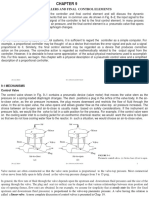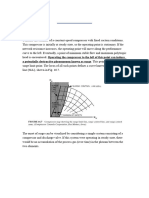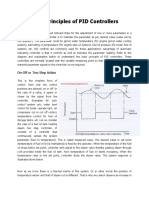0 ratings0% found this document useful (0 votes)
46 viewsOn-Off Control: Bang-Bang Control Thermostat Negative Feedback
Simple on-off control systems like thermostats and pressure switches provide negative feedback by switching devices like heaters or pumps on when a process variable like temperature or pressure drops below a setpoint, and off when it rises above. These systems are cheap and effective for some applications. However, they can cause excessive wear from frequent starting and stopping, so practical systems include an adjustable hysteresis or deadband around the setpoint where the device remains unchanged to reduce cycling.
Uploaded by
marina890416Copyright
© © All Rights Reserved
Available Formats
Download as DOCX, PDF, TXT or read online on Scribd
0 ratings0% found this document useful (0 votes)
46 viewsOn-Off Control: Bang-Bang Control Thermostat Negative Feedback
Simple on-off control systems like thermostats and pressure switches provide negative feedback by switching devices like heaters or pumps on when a process variable like temperature or pressure drops below a setpoint, and off when it rises above. These systems are cheap and effective for some applications. However, they can cause excessive wear from frequent starting and stopping, so practical systems include an adjustable hysteresis or deadband around the setpoint where the device remains unchanged to reduce cycling.
Uploaded by
marina890416Copyright
© © All Rights Reserved
Available Formats
Download as DOCX, PDF, TXT or read online on Scribd
You are on page 1/ 1
Onoff control
For more details on this topic, see Bangbang control.
A thermostat is a simple negative feedback controller: when the temperature (the "process
variable" or PV) goes below a set point (SP), the heater is switched on. Another example could
be a pressure switch on an air compressor. When the pressure (PV) drops below the threshold
(SP), the pump is powered. Refrigerators and vacuum pumps contain similar mechanisms
operating in reverse, but still providing negative feedback to correct errors.
Simple onoff feedback control systems like these are cheap and effective. In some cases, like
the simple compressor example, they may represent a good design choice.
In most applications of onoff feedback control, some consideration needs to be given to other
costs, such as wear and tear of control valves and perhaps other start-up costs when power is
reapplied each time the PV drops. Therefore, practical onoff control systems are designed to
include hysteresis which acts as a deadband, a region around the setpoint value in which no
control action occurs. The width of deadband may be adjustable or programmable.
You might also like
- Bionic Turtle FRM Practice Questions P1.T1. Foundations of Risk Chapter 1. The Building Blocks of Risk Management100% (1)Bionic Turtle FRM Practice Questions P1.T1. Foundations of Risk Chapter 1. The Building Blocks of Risk Management17 pages
- Logic Control: Logic or Sequential Controls Feedback Linear Fuzzy Logic Logic Not ControllableNo ratings yetLogic Control: Logic or Sequential Controls Feedback Linear Fuzzy Logic Logic Not Controllable6 pages
- Prolific's Training Program Controllers: Prolific Systems and Technologies PVT LTDNo ratings yetProlific's Training Program Controllers: Prolific Systems and Technologies PVT LTD24 pages
- B U L L E T I N: Application EngineeringNo ratings yetB U L L E T I N: Application Engineering6 pages
- Controllers and Final Control Elements: 24/12/2016 Dr. Arkan Jasim Hadi 1No ratings yetControllers and Final Control Elements: 24/12/2016 Dr. Arkan Jasim Hadi 127 pages
- Technical Reference - Tuning A PID ControllerNo ratings yetTechnical Reference - Tuning A PID Controller6 pages
- By Douglas C. Hittle, PH.D., Fellow ASHRAENo ratings yetBy Douglas C. Hittle, PH.D., Fellow ASHRAE5 pages
- HTTP WWW - Spiraxsarco.com Resources Steam-Engineering-tutorials Control-Applications Pressure-Contr NewNo ratings yetHTTP WWW - Spiraxsarco.com Resources Steam-Engineering-tutorials Control-Applications Pressure-Contr New15 pages
- PID Made Simple: BY: Jim Elliott 8/20/97No ratings yetPID Made Simple: BY: Jim Elliott 8/20/978 pages
- Brief Introduction To Distillation Control: 3 Main Objectives100% (1)Brief Introduction To Distillation Control: 3 Main Objectives10 pages
- Basic Principles of PID Controllers: On-Off or Two Step ActionNo ratings yetBasic Principles of PID Controllers: On-Off or Two Step Action18 pages
- Final Control Elements - Control Valves: Valve Failure ModeNo ratings yetFinal Control Elements - Control Valves: Valve Failure Mode5 pages
- Lecture VI - PID Controller in Pneumatic System (Use Case)100% (2)Lecture VI - PID Controller in Pneumatic System (Use Case)21 pages
- Boiler Control -- AGS_0a57530c64f220527f0271298e3cc4f0No ratings yetBoiler Control -- AGS_0a57530c64f220527f0271298e3cc4f048 pages
- Lab Manual: Instrumentation and ControlNo ratings yetLab Manual: Instrumentation and Control42 pages
- Understanding Centrifugal Compressor Capacity Controls100% (3)Understanding Centrifugal Compressor Capacity Controls5 pages
- Troubleshooting Process Plant Control: A Practical Guide to Avoiding and Correcting MistakesFrom EverandTroubleshooting Process Plant Control: A Practical Guide to Avoiding and Correcting Mistakes1/5 (2)
- Physical Chemistry Chemical Engineering Mechanical Engineering Joseph Black Carnot Napoleonic Wars Lord KelvinNo ratings yetPhysical Chemistry Chemical Engineering Mechanical Engineering Joseph Black Carnot Napoleonic Wars Lord Kelvin1 page
- The Objective of This Report Is To Characterise A Plate With A Hole When It Is Subjected Under TensionNo ratings yetThe Objective of This Report Is To Characterise A Plate With A Hole When It Is Subjected Under Tension10 pages
- A Categorization of These Constitutive Relations Allows Further Categorization ofNo ratings yetA Categorization of These Constitutive Relations Allows Further Categorization of1 page
- Thermodynamics Is A Branch of Physics Concerned With Heat and TemperatureNo ratings yetThermodynamics Is A Branch of Physics Concerned With Heat and Temperature1 page
- Rigid-Body Dynamics Studies The Movement of Systems of Interconnected Bodies Under The ActionNo ratings yetRigid-Body Dynamics Studies The Movement of Systems of Interconnected Bodies Under The Action1 page
- Force and Torque Multiplication: Examples Two Hydraulic Cylinders InterconnectedNo ratings yetForce and Torque Multiplication: Examples Two Hydraulic Cylinders Interconnected1 page
- CO India Delivery OHS Non-Compliance CMM Policy Ver1.0No ratings yetCO India Delivery OHS Non-Compliance CMM Policy Ver1.010 pages
- Honeywell Protect Process Control SystemsNo ratings yetHoneywell Protect Process Control Systems21 pages
- Chapter - 2 Knowledge-Based System ArchitectureNo ratings yetChapter - 2 Knowledge-Based System Architecture27 pages
- Politics of Choice - Deconstructing The Idea of MarriageNo ratings yetPolitics of Choice - Deconstructing The Idea of Marriage3 pages
- Ground Vibration Induced by Collapse of A 235M High Cooling TowerNo ratings yetGround Vibration Induced by Collapse of A 235M High Cooling Tower8 pages
- Australian International School, Dhaka: Formative Assessment - 1 20-21 Term 2 MYP 5 (Year 10) Subject: - MathematicsNo ratings yetAustralian International School, Dhaka: Formative Assessment - 1 20-21 Term 2 MYP 5 (Year 10) Subject: - Mathematics8 pages
- Lethbridge-Stewart and The Band of EvilNo ratings yetLethbridge-Stewart and The Band of Evil42 pages
- Fact Sheet: The Need For ICWA ICWA Implementation ConcernsNo ratings yetFact Sheet: The Need For ICWA ICWA Implementation Concerns2 pages
- Social Media Use and Escapism Among IndiNo ratings yetSocial Media Use and Escapism Among Indi86 pages
- Constitutional Law2 Ayala de Roxas Vs City of Manila January 30, 2020 Case DigestNo ratings yetConstitutional Law2 Ayala de Roxas Vs City of Manila January 30, 2020 Case Digest5 pages












































































































